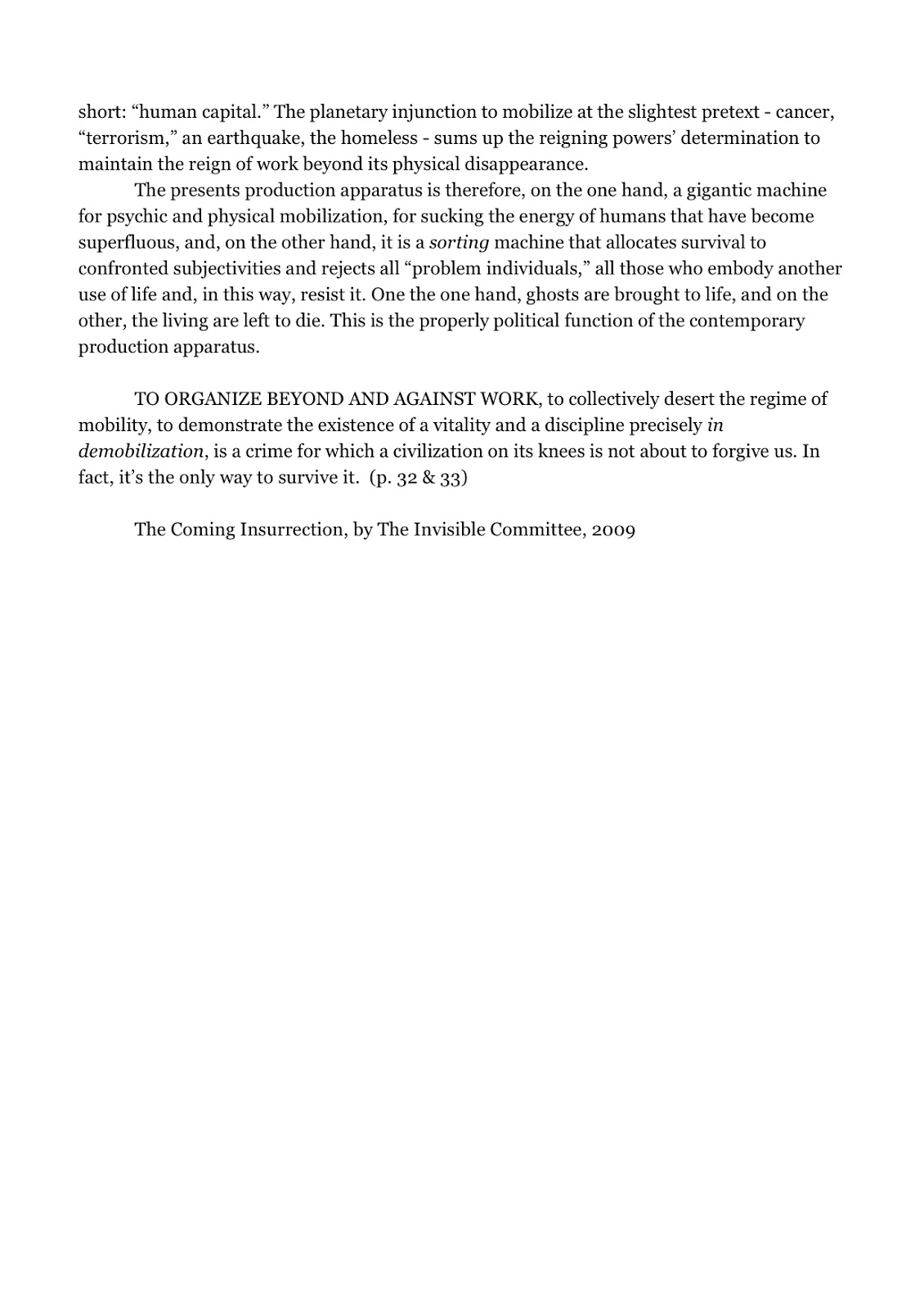Criptic Critic Conscience and Known for it
Tuesday, July 14, 2015
work has totally triumphed over all other ways of existing, at the very moment when workers have become superfluous. - Notes from the Invisible Committee
Freedom isn’t the act of shedding our attachments, but the practical capacity to work on them. (p. 20)
Intelligence doesn’t mean knowing how to adapt - or if that is a kind of intelligence, it’s the intelligence of slaves. Our inadaptability, our fatigue, are only problems from the standpoint of what aims to subjugate us. (p. 21)
Here lies the present paradox: work has totally triumphed over all other ways of existing, at the very moment when workers have become superfluous. (p. 30)
THE ORDER OF WORK WAS THE ORDER OF A WORLD. The evidence of its ruin
is paralyzing to those who dread what will come after. Today work is tied less to the economic necessity of producing goods than to the political necessity of producing producers and consumers, and of preserving by any means necessary the order of work. Producing oneself is becoming the dominant occupation of a society where production no longer has an object: like a carpenter who’s been evicted from his shop and in desperation sets about hammering and sawing himself.
All these young people smiling for their job interviews, who have their teeth whitened to give them an edge, who go to nightclubs to boost the company spirit, who learn English to advance their careers, who get divorced or married to move up the ladder, who take courses in leadership or practice “self-improvement” in order to better”manage conflicts” - “the most intimate ‘self-improvement’”, says one guru, “will lead to increased emotional stability, to smoother and more open relationships, to sharper intellectual focus, and therefore to a better economic performance.” This swarming little crowd that waits impatiently to be hired while doing whatever it can to seem natural is the result of an attempt to rescue the order of work through an ethos of mobility.
To be mobilized is to relate to work not as an activity but as a possibility. If the unemployed person removes his piercings, goes to the barber and keeps himself busy with “projects,” if he really works on this “employability,” as they say, it’s because this is how he demonstrates his mobility. Mobility is this slight detachment from the self, this minimal disconnection from what constitutes us, this condition of strangeness whereby the self can now be taken up as an object of work, and it now becomes possible to sell oneself rather than one’s labor power, to be remunerated not for what one does but for what one is, for our exquisite mastery of social codes, for our relational talents, for our smile and our way or presenting ourselves.
This is the new standard of socialization. Mobility brings about a fusion of the two contradictory poles of work: here we participate in our own exploitation, and all participation is exploited. Ideally, you are yourself a little business, your own boss, your own product. Whether one is working or not, it’s a question of generating contacts, abilities, networking, in short: “human capital.” The planetary injunction to mobilize at the slightest pretext - cancer, “terrorism,” an earthquake, the homeless - sums up the reigning powers’ determination to maintain the reign of work beyond its physical disappearance.
The presents production apparatus is therefore, on the one hand, a gigantic machine for psychic and physical mobilization, for sucking the energy of humans that have become superfluous, and, on the other hand, it is a sorting machine that allocates survival to confronted subjectivities and rejects all “problem individuals,” all those who embody another use of life and, in this way, resist it. One the one hand, ghosts are brought to life, and on the other, the living are left to die. This is the properly political function of the contemporary production apparatus.
TO ORGANIZE BEYOND AND AGAINST WORK, to collectively desert the regime of mobility, to demonstrate the existence of a vitality and a discipline precisely in demobilization, is a crime for which a civilization on its knees is not about to forgive us. In fact, it’s the only way to survive it. (p. 32 & 33)
The Coming Insurrection, by The Invisible Committee. 2009
Subscribe to:
Post Comments (Atom)


No comments:
Post a Comment